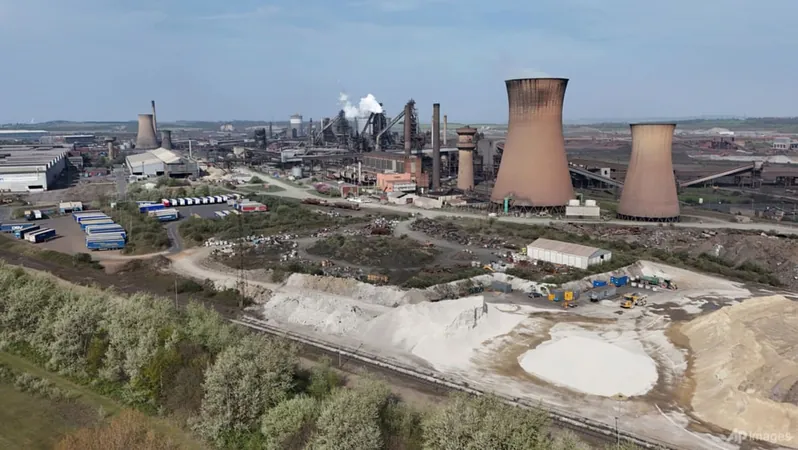
UK Steps In to Save British Steel: A Bold Move Amidst Global Challenges
2025-04-14
Author: Jia
In a dramatic turn of events, the UK government has taken operational control of British Steel, the nation’s last producer of virgin steel, after its Chinese owners signaled plans to shut down critical operations. On April 14, officials expressed renewed optimism about securing the necessary raw materials to keep the blast furnaces at the Scunthorpe plant running.
The Chinese Jingye Group, which faced a funding proposal rejection, preferred halting production, potentially forcing the UK to rely on imported steel. This prompted an emergency recall of parliament—the first since the Falklands conflict in 1982—enabling the government to direct company operations and ensure the flow of resources.
By Monday morning, the government swiftly appointed Allan Bell as interim chief executive and Lisa Coulson as chief commercial officer, both seasoned veterans of the plant. Treasury minister James Murray emphasized the urgent need to fuel the furnaces, noting, "We need to make sure we get it into the blast furnaces." Fortunately, adequate raw materials have already been identified within the country.
Several key industry players, including Tata and local distributor Rainham Steel, have offered their support in managing the operations and providing essential materials.
However, the move risks straining UK-China relations just as Prime Minister Keir Starmer's Labour government aimed to strengthen ties amidst increasing global trade cooperation. Jingye has yet to respond officially, but China called for fair treatment and dialogue.
Murray reiterated the critical nature of this intervention, stating, "The facts on the ground are very clear; without our actions, the blast furnaces would be closing," underscoring that steel production is a matter of national security.
In Scunthorpe, these furnaces are losing approximately £700,000 ($922,000) daily. Their output serves foundational industries like rail, construction, and automotive. With geopolitical tensions and trade wars on the rise, any closure could thrust Britain into an import-dependent status.
This intervention also raises significant employment concerns, as the site provides jobs for around 3,500 people directly, alongside numerous positions in the broader supply chain. Business Minister Jonathan Reynolds declared that China is no longer welcome in the UK’s steel sector.
As British Steel navigates these turbulent waters, the appointment of interim bosses is seen as a step towards providing stability. The company already faced challenges from an oversupplied global market before being further hurt by rising energy costs and the recent imposition of 25% tariffs on US steel imports beginning in March.
Union representatives and industry bodies, including UK Steel, have welcomed the government’s intervention, recognizing the potential nationalization of the plant as a viable option. The wheat from the chaff is becoming increasingly evident as the UK aims to maintain its steel production capabilities.
China’s foreign ministry responded by urging the UK to engage in fair and non-political discussions to resolve the British Steel crisis, underscoring the need for a mutually beneficial resolution to restore confidence among Chinese investors.




 Brasil (PT)
Brasil (PT)
 Canada (EN)
Canada (EN)
 Chile (ES)
Chile (ES)
 Česko (CS)
Česko (CS)
 대한민국 (KO)
대한민국 (KO)
 España (ES)
España (ES)
 France (FR)
France (FR)
 Hong Kong (EN)
Hong Kong (EN)
 Italia (IT)
Italia (IT)
 日本 (JA)
日本 (JA)
 Magyarország (HU)
Magyarország (HU)
 Norge (NO)
Norge (NO)
 Polska (PL)
Polska (PL)
 Schweiz (DE)
Schweiz (DE)
 Singapore (EN)
Singapore (EN)
 Sverige (SV)
Sverige (SV)
 Suomi (FI)
Suomi (FI)
 Türkiye (TR)
Türkiye (TR)
 الإمارات العربية المتحدة (AR)
الإمارات العربية المتحدة (AR)